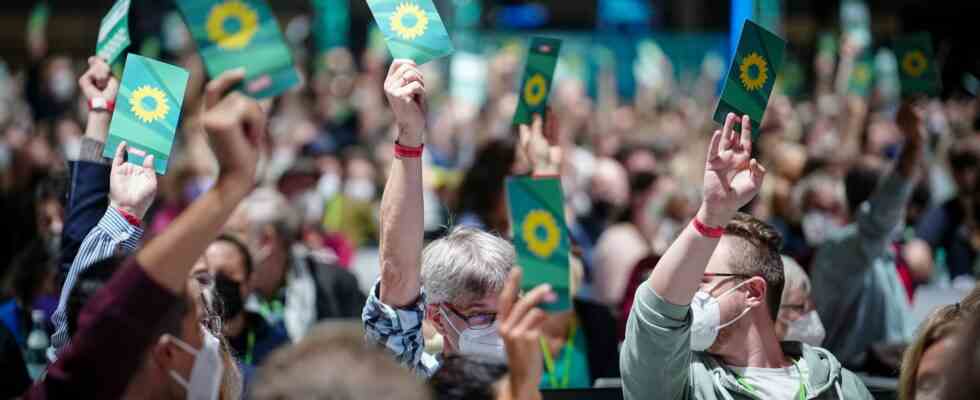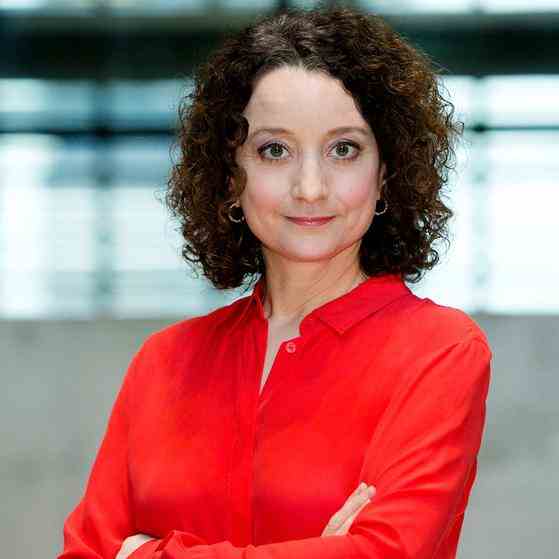analysis
Status: 10/16/2022 7:01 p.m
Arms exports to Saudi Arabia, nuclear power plants on standby – as the governing party, the Greens are in a dilemma on key issues. Why does the party congress support these unreasonable demands without a loud argument?
When Annalena Baerbock enters the stage, it has long been clear: the Greens have to rethink many of their basic beliefs. The Greens as a peace party, what does that actually mean against the background of the Russian war of aggression? This is not the only question that is not discussed loudly in Bonn, but is discussed controversially.
Baerbock defends the course of the government. “We support Ukraine humanitarianally, financially, but also with weapons for self-defense,” she says, not despite, but because the Greens are a peace and human rights party. Finally, the delegates voted with a large majority for arms deliveries to Ukraine.
Party supports their top
The party stands behind its leaders, even if many decisions cause audible grumbling. The Green Jenny Laube from Berlin thinks that there is neither a need nor a justification for the recent arms exports to Saudi Arabia. A motion to reverse the decision doesn’t even make it to a vote. The decision was not made on the big stage, but behind the scenes.
In a party congress resolution, the Greens fundamentally reject arms exports to Saudi Arabia. Baerbock admits: It’s a dilemma. At the same time, the Foreign Minister is promoting European armaments cooperation. This is not least so that social spending in Germany is not cut in favor of defense spending.
Dispute over Lützerath with symbolic power
The next dilemma – climate protection. Due to the energy crisis, the Lützerath settlement in the Rhenish area is to be dredged. But the coal phase-out in NRW will come earlier: 2030 instead of 2038. That is the deal between the green-led federal and NRW economic ministries and the energy company RWE.
The Green Youth is against it and calls for a moratorium on the evacuation of the symbolic village of the climate movement. After an emotional and controversial debate, however, they fail with their demand because of the green government’s pragmatism.
consent to the imposition
Right from the start of the delegates’ conference, the focus is on energy policy. Actually, nuclear power should be over by the end of the year. Now the anti-nuclear party is struggling with an operational reserve. But things are different these days. When Federal Minister of Economics Robert Habeck promoted the reserve operation of the two southern German nuclear power plants, he assured: A return to nuclear power is not – that will definitely not happen with the Greens.
Environment Minister Steffi Lemke does not even talk about it: what the federal executive board has presented is an “imposition”. And now she’s standing here and promoting this impertinence. In the end, the delegates follow their party leadership here as well and vote for a temporary deployment reserve of Isar 2 and Neckarwestheim 2.
There are still red lines: no new fuel elements, party leader Ricarda Lang calls out to the delegates. In addition, reserve operation should end on April 15th. A decision that gives Habeck little leeway in the negotiations with the FDP on the nuclear power issue and is likely to cause further conflict in the traffic light government. And with that, the biggest dilemma of the Greens will be postponed from Bonn to Berlin. Other answers must now be found as to how the dispute will be resolved. Perhaps the chancellor by speaking a word of power in the green-yellow dispute?
“There is only a need for a longer nuclear power plant runtime this winter,” Katharina Dröge, leader of the Bündnis90/Die Grünen parliamentary group
Report from Berlin 6:00 p.m., 16.10.2022
Convictions meet knowledge of what is feasible
The Greens want to provide answers – and take responsibility. They confidently emphasize their role as the governing party. Green leader Omid Nouripour puts it this way: “We support this state, this society.” There is a lot of applause for that, as well as for Robert Habeck, who almost swears by the base: “It’s worth being in the government,” he calls out to the hall. In the past few months, the party has had to make difficult decisions at an “insane speed,” he says, and has proven that it is “rightly” responsible.
But it is a dilemma when fundamental convictions come up against the realization of what is feasible. “We don’t do politics for the reality we want, but for the reality that is there,” said party leader Ricarda Lang before the party conference, and she repeated it this weekend. The Greens follow the pragmatic course.
“We don’t make politics for the reality that we want, but for the reality that is there” – party leader Ricarda Lang.
Image: dpa
Intensely controversial debates are held, but without much rebellion, without arguments on the open stage. Numerous counter-motions are combined, inserted into leading motions, and withdrawn. The majority of the delegates are there for the first time at a face-to-face party conference – many young Greens, self-confident, at the same time goal-oriented and willing to compromise.
The Green Youth does not want to lose touch with the climate movement. Nevertheless, she is willing to make compromises on the subject of climate protection and to follow her party leadership, including Economics Minister Habeck and Foreign Minister Baerbock. At least now, in times of crisis.


